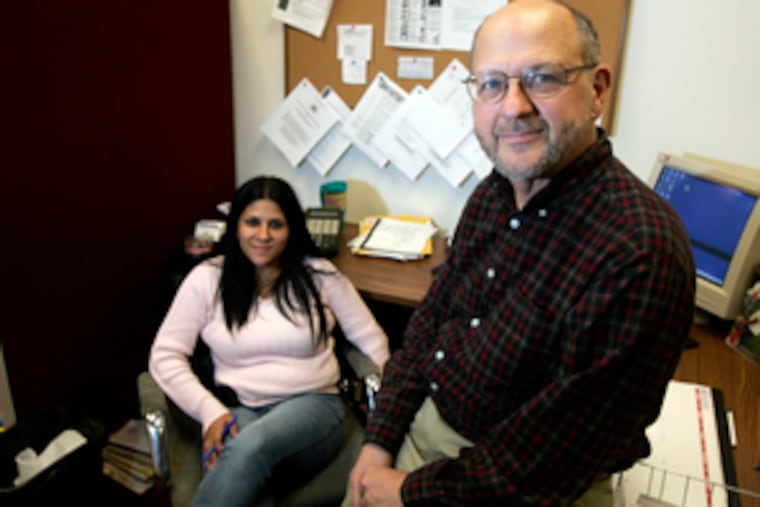Sweating as resets of mortgage rates near
Subprime loans created a crisis.

It hasn't been easy, but Edward L. Moye has been making the $1,700 monthly payments on his $280,000 mortgage since he took it out in June 2005.
But come June, his 6.9 percent interest rate is scheduled to start adjusting, Moye said yesterday. That could boost his payment to $2,000 or more, and the West Norriton resident knows he cannot afford it.
Moye is among the estimated two million homeowners facing interest-rate resets on their adjustable-rate mortgages over the next 18 months. Anticipation that the rate of defaults on those loans will soar led government and industry officials to devise a plan - expected to be revealed this week - to stem a growing credit crisis.
Like many other borrowers, Moye figured he would ride the wave of rising house prices and refinance before the rate went up.
Then, the market changed.
The real estate bubble started deflating, loan defaults shot up, and the flow of easy credit for those with less-than-pristine credit dried up.
"I'm not desolate. I'm not behind. I'm not going to wait around for the roof to cave in," said the retired state trooper, who is working with Acorn Housing counselors on a deal with Citifinancial that would keep him in his house.
"Boy, have they tightened the screws on this thing," said Moye, 48, who has been rebuffed by six lenders he approached about refinancing.
Because he is not behind on his payments, Moye could benefit from the plan being negotiated among banks, mortgage servicers and investors - with prodding from Treasury Secretary Henry M. Paulson Jr.
Part of that plan would freeze introductory interest rates on certain subprime mortgages. Other aspects include finding ways to do a better job of reaching borrowers in trouble, getting investors to pay for credit counseling, and boosting refinancing options.
A big uncertainty is the duration of the freeze, which could be anywhere from one to seven years.
Local housing activists said they favored a permanent freeze, but were hoping for seven years.
"If you just freeze it for 12 months, you're just delaying the problem," said Bruce Dorpalen, the Philadelphia-based national director of housing counseling for Acorn Housing, a nonprofit that advocates for the poor.
"We hope it's long enough that people really can restore their finances," said Dorpalen, whose group has a call center in Chicago with six counselors who work on loan modifications.
In 2005 and 2006, lenders made 101,119 subprime loans worth $13.62 billion in the eight-county Philadelphia area, according to federal data. The share of loans issued here that are subprime climbed from 20 percent in 2005 to 26 percent in 2006 in number terms and from 17 percent to 23 percent in terms of value.
It is too soon to tell how many of those subprime borrowers can be helped by the proposal expected out of Hope Now, an alliance formed in October whose membership includes 17 mortgage lenders and servicers that account for 60 percent of the U.S. mortgage-servicing business.
"I think there is still a lot to be worked out" about categories of borrowers and what will be done to help them, said mortgage executive Regina M. Lowrie, a former chairman of the Mortgage Bankers Association. She cautioned that troubled borrowers should not expect blanket modifications to their loans.
"As far as I understand it, if a borrower is 90 to 120 days delinquent when this is announced, they will not qualify in one of those categories, said Lowrie, an industry veteran who recently started Vision Mortgage Capital, of Blue Bell, to focus on FHA lending and reverse mortgages.
If Lowrie is right, many borrowers - such as Michael and Patricia Stratton of the Logan section of Philadelphia - will be left to fight foreclosure with the help of nonprofit advocacy groups.
The Strattons fell behind last spring on their $68,000 adjustable-rate mortgage from the now-defunct New Century Financial Corp. after Michael, a construction worker, was injured.
Samantha Arens, a housing counselor with the Philadelphia Unemployment Project, is fighting the Strattons' foreclosure and trying to get the current servicer of their loan - Countrywide Financial Corp. - to keep the interest rate at the introductory level of 8.9 percent.
Adjustments are scheduled to begin in October, with the rate increasing as much as 1.5 percentage points every six months, with a cap of 16.9 percent, Arens said.
The current payment is $545 a month. Patricia Stratton, who works in Bala Cynwyd as a customer-service representative, said that she had no idea how high it could go, and that "I'm scared to find out."
The Philadelphia Unemployment Project has a campaign to persuade Countrywide - the largest lender in the Philadelphia area and nationwide - to give troubled borrowers fixed-rate mortgages they can afford.
"It really makes sense for everybody to not allow these things to go all the way to foreclosure," said John Dodds, the group's director.
Without decisive action to prevent foreclosures, investors are going to own many stripped-out houses in places like West Oak Lane and Southwest Philadelphia. "Or they could get 7 or 8 percent," he said.